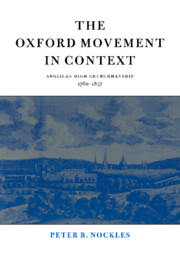Book contents
- Frontmatter
- Contents
- Preface
- List of abbreviations
- Historiographical introduction
- 1 Church and state: the politics of High Churchmanship
- 2 Antiquity and the rule of faith
- 3 Ecclesiology: the apostolic paradigm
- 4 Spirituality, liturgy and worship
- 5 The economy of salvation: sacraments and Justification
- 6 The old High Churchmen and Tractarians in historical relation
- Conclusion
- Select bibliography
- Index
3 - Ecclesiology: the apostolic paradigm
Published online by Cambridge University Press: 23 September 2009
- Frontmatter
- Contents
- Preface
- List of abbreviations
- Historiographical introduction
- 1 Church and state: the politics of High Churchmanship
- 2 Antiquity and the rule of faith
- 3 Ecclesiology: the apostolic paradigm
- 4 Spirituality, liturgy and worship
- 5 The economy of salvation: sacraments and Justification
- 6 The old High Churchmen and Tractarians in historical relation
- Conclusion
- Select bibliography
- Index
Summary
APOSTOLIGITY OF ORDER AND HIGH CHURCHMANSHIP, 1760–1840
A belief in the divine basis of a threefold ministerial order, an episcopal system of church government and a lineal succession of the episcopate, represented a key component of traditional High Churchmanship. Notwithstanding the Reformation, the Church of England was deemed to have preserved apostolicity of ministerial order. This claim figured prominently in the apologetic of the Caroline Divines in controversy with both Presbyterian and Roman Catholic opponents, and found classic expression in the celebrated Three Letters to the Bishop of Bangor (1717–19) by the Nonjuror, William Law.
A reassertion of the doctrine of the necessity of an apostolic ministerial commission was integral to early Tractarian polemic. The catenae patrum in the Tracts in favour of apostolical succession was in this case conclusive proof that the Tractarian advocacy was no novelty, since eighteenth-century witnesses such as Home and Jones of Nayland were cited as well as their predecessors from the Stuart era. Yet, as on other questions, it suited the purposes of Tractarian rhetoric to portray their advocacy of apostolical succession as the recovery of an ancient truth lost sight of in the ‘deadness’ of eighteenth-century Anglicanism. The assumption was made that the focus on apostolical succession in the early Tracts had roused discussion ‘on points which had long remained undisturbed’. This assumption deserves questioning.
The testimony of both Gladstone and Bishop Blomfield supported the Tractarian view. Blomfield ‘is said to have remarked that after William Law's Letters to the Bishop of Bangor, no writer asserted the doctrine of apostolical succession until the Tractarians arose’.
- Type
- Chapter
- Information
- The Oxford Movement in ContextAnglican High Churchmanship, 1760–1857, pp. 146 - 183Publisher: Cambridge University PressPrint publication year: 1994



